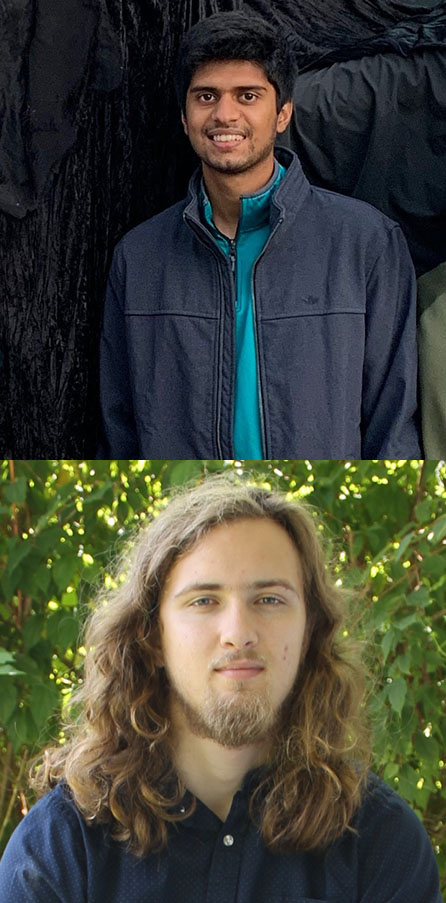CMU's AI Undergraduate Program Confers Its First Degrees Students Who Opted for New Program "Are Definitely Pioneers"
Byron SpiceWednesday, May 13, 2020Print this page.

Artificial intelligence caught Shashank Ojha's imagination while he was a student at Thomas Jefferson High School for Science and Technology in Alexandria, Virginia. He took the few AI courses the school offered and soon set his sights on attending Carnegie Mellon University.
"I knew that CMU was the place to be for AI," he explained. His plan when he entered CMU in 2016 was to pursue a bachelor's degree in computer science, with minors in machine learning and robotics. What he hadn't counted on was the School of Computer Science's 2018 decision to launch the nation's first undergraduate AI degree program.
Normally, first-year computer science majors choose their major in the spring, but Ojha and a small group of sophomores and juniors joined the brand-new program that fall. Now, the first of those trailblazers will graduate this month.
"The 18 students in our initial cohort are definitely pioneers — they joined a new program when most of them hadn't even yet taken a course in AI," said Reid Simmons, director of the undergraduate AI program. Even now, with 96 students in the program, the AI majors are still pioneers, as the marketplace for bachelor's degrees in AI is only now being tested, he added.
"We firmly believe that with the combination of strong core knowledge in computer science and the specialization in AI that our students will be able to get jobs anywhere, but obviously many students are somewhat hesitant until they've seen the results," Simmons said.
For what it's worth, the first two AI graduates have great jobs. Ojha, from Herndon, Virginia, has been hired as a motion planning and controls engineer for Nuro, a robotics startup in Silicon Valley co-founded by a CMU robotics alumnus that uses autonomous vehicles to deliver food and groceries. Alexander Litzenberger, of Shohola, Pennsylvania, is launching his own startup, Agot.ai, which applies AI to the restaurant sector. He's even hired an AI major as an intern for this summer.
Unlike Ojha, Litzenberger didn't arrive at CMU with visions of AI swirling in his head. His interest was in theoretical computer science, including cryptography and computational complexity. But after he took courses in AI and machine learning, he began to think about what a career in AI might look like.
"I think the creation of the AI degree was a vote of confidence in the future of AI," he said. Master's and doctoral degrees in machine learning and other AI disciplines have already proven to be practical and of real value, he observed, which helped convince him to enter the undergraduate AI program.
The idea behind Agot likewise came from reasoning about how AI could be used in the world. Litzenberger and a partner, whose family has operated a restaurant equipment showroom, got the idea to use computer vision to keep track of a customer's order as it was being prepared and to automatically tally up the bill.
"As it is now, cashiers effectively are doing data entry," Litzenberger said. In addition to automating that function, Agot also can monitor employee performance and other operational details, providing information to management that otherwise might be missed.
"Our vision is to autonomously manage a restaurant," he said.
For Ojha, the AI program helped him strike a balance between theoretical computer science and applications and other hands-on work. After joining the AI program, he connected with Maxim Likhachev, an associate professor of robotics who specializes in robot planning.
"Planning is the perfect balance of theory and application I was looking for," Ojha said. "I finally discovered my passion." His exposure to Likhachev's courses in turn led him to discover courses in related areas. "If it weren't for those robotics courses, I probably wouldn't have had the skill set to work at Nuro," he added.
Simmons said he expects other computer science programs will eventually add their own undergraduate AI degree programs. In the meantime, he is working with educators across CMU to create AI courses in specialized areas and to make AI education accessible to more students. For instance, the university is building a 2,000-square-foot AI "maker space," which will house robots, drones, smart appliances, virtual and augmented reality devices, and high-end computers for students to use for class projects and individual research.
With graduation upon them, both Litzenberger and Ojha said they are happy with their decision to opt for the new AI degree.
"It feels cool that I'm one of the first," Ojha added.
Dietrich College alum Jared Leinbach really earned the first AI degree from CMU in 1988, when he graduated with a self-defined major.
Byron Spice | 412-268-9068 | bspice@cs.cmu.edu<br>Virginia Alvino Young | 412-268-8356 | vay@cmu.edu
